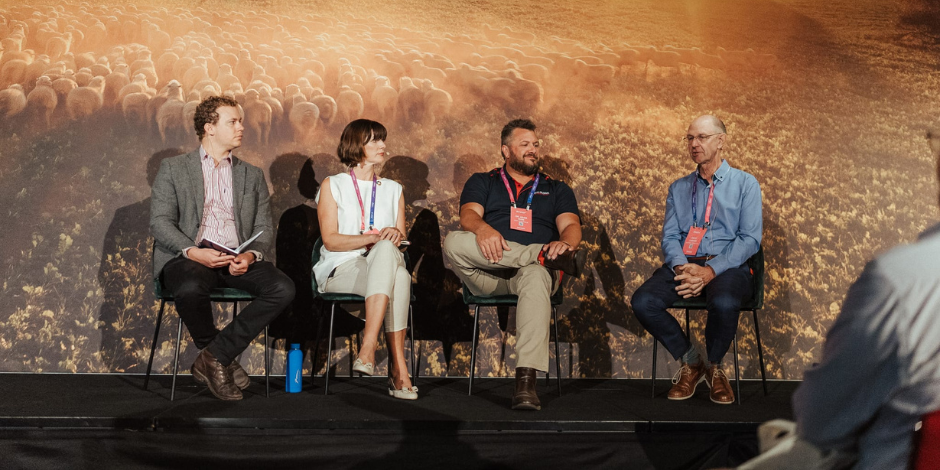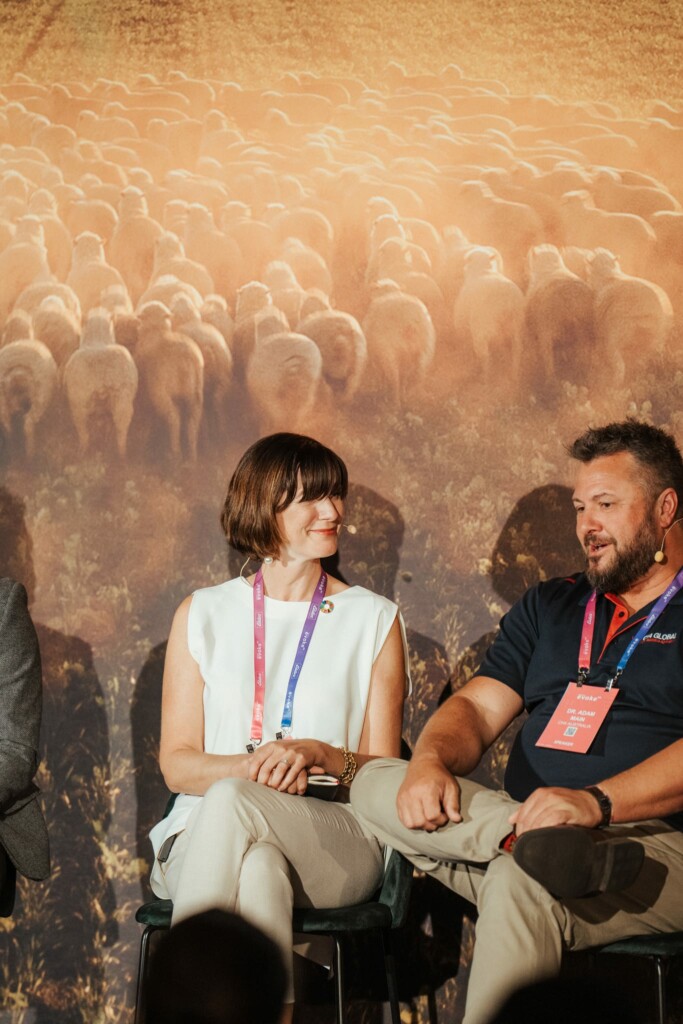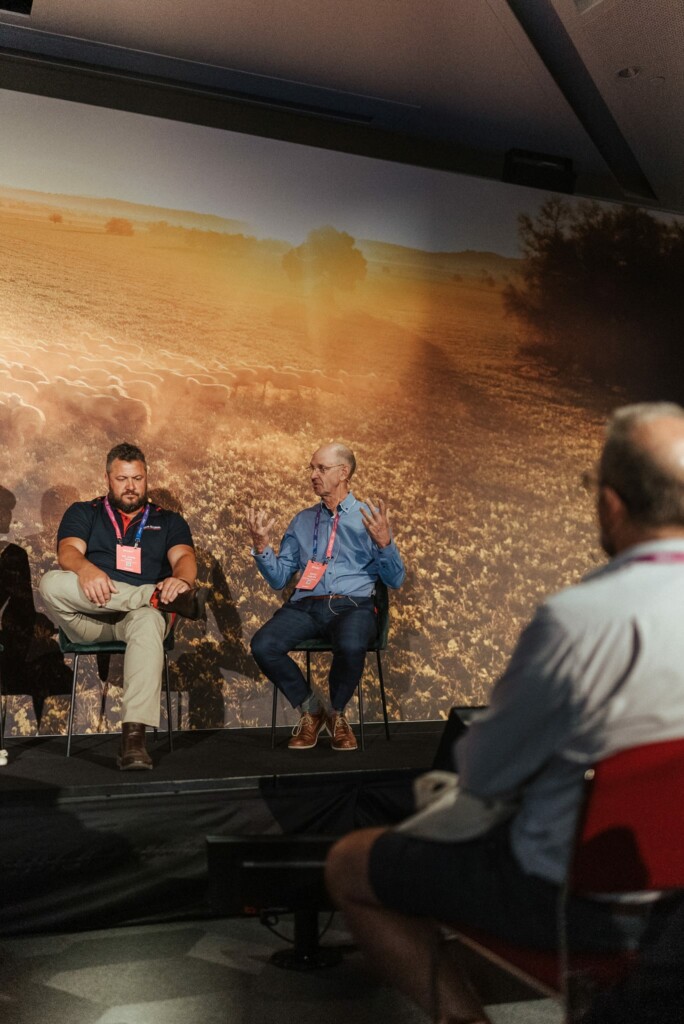Make it waterproof: opportunities for agtech in the ocean’s blue economy
Australia has the third largest marine area in the world and the ‘blue economy’ already contributes more than $81 billion* to the nation’s bottom line. And like land-based agriculture, there’s increasing pressure for the sustainable use of ocean resources for economic growth and to produce food and energy, while conserving the ecosystem.

A panel of experts at evokeAG. 2023 discussed turning a blue industry green, exploring the common challenges both industries are facing to become more sustainable and how shared innovation and technology can help both sectors.
Director of the not-for-profit Ocean Decade Australia, Dr Lucy Buxton, said the blue economy has learned a lot from land-based farming and there’s opportunities to share the benefits of technology and innovation.
“In aquaculture there are ways that industries can use new feed, or data or sensor technology to reduce waste, increase profitability and reduce the impact on the environment,” she said.
“Likewise in biotechnology, there is really fascinating aspects in micro-algal research and macro-algal research which can be used as feedstock to produce food, fuel and fibre.”
CH4 Australia General Manager, Dr Adam Main, had a clear message for innovators in evokeAG.’s signature Startup Alley and further afar.
“Take your technology that you’ve developed for viticulture, cherries, tomatoes and come and talk to me, it’s the exact same tech I’ll use with oysters, seaweed and mussels,” he said. “You can double your income if you are a producer of agtech, and can make it waterproof.”
Lucy agreed, “There’s a lot of tech … that can be translated to the marine sector as well. From remote sensing, to efficiencies in harvesting, as well as transparency and authentication of produce. I would challenge everyone to consider how that might play out both on land and at sea.”
Sustainability challenges
When discussing the sustainability of the ocean estate, Lucy urged delegates to consider more than just how resources are used, pointing to the natural capital of the ocean and the value of industries that meet the triple bottom line.
“The ocean is becoming a busier place,” she said. “Off-shore renewable energy developments will play a role in meeting global reduction in greenhouse gas emissions, but we also need food security and we need manage our natural habitat.”
With more than 20 years’ experience in aquaculture, Adam argued that the use of marine resources doesn’t have to come at a cost.

“Seaweed is a tremendous example of an aquaculture system that has a positive effect on the marine ecosystem,” he said. “While we are out there growing a material to feed to a cow to offset methane we are taking in nitrogen, phosphorus, carbon in the marine environment.”
“The future I see, is helping aquaculture ventures that are contributing to a nutrient profile of an area by adding seaweed to the mix. We need their waste and that will help our seaweed grow and that will help offset their contribution.”
From a wild catch perspective, CEO of Austral Fisheries, David Carter said Australia “punches above its weight” in terms of the quality of fisheries management.
“Our science has improved, our understanding of the stocks and the ecosystems that support those has come a long way … it’s been more than 20 years since we embraced concepts around third-party sustainability certification.”

David believes the challenge is finding a balance between use and protection of our oceans.
“I think it is too easy to simply lock our oceans up and hope to sustain a lifestyle of exotic marine protein from other jurisdictions, that to me that is immoral,” he said. “As a first world wealthy economy it behoves us to … ensure that we can strike that balance.”
He pointed to the value of collaborative and multidisciplinary research to understand the impacts of warming oceans on target fish species, including how to risk proof industries.
Finding solutions
Lucy said that ocean acidification and ocean temperature warming, along with biodiversity and habitat loss were key concerns globally.
“As we see a lot with other industries, including land-based agriculture, those risks can be turned into opportunity,” she said.
“Action being taken both nationally and on the international stage through a number of intergovernmental frameworks is really driving incredible innovation in this space.”
She argues that Australia is uniquely positioned to tackle the issues.
“With the habitats that we have, the extensive coastline, and the depth of knowledge of our (ocean) estate through First Nations and also our modern industries we are already applying changes to the way we look at some traditional coastal and ocean-based industries but also the circular side of those industries.”
There’s also examples of how ‘blue industries’ can help land-based agriculture tackle some of the big issues, such as CH4 Australia’s methane reducing supplements for cattle made from Asparagopsis seaweed.
Adam told evokeAG. 2023 it’s not a silver bullet but is a significant development.
“It’s a natural product, it’s a product of Australia … it’s our seaweed, it grows well, and it lends itself to aquaculture,” he said.
“The kind of momentum that starts by placing investment into a technology like ours generates a whole range of other thinking that hasn’t occurred before, and we’ll find five other species in the next five years that do as well or better than what we are currently looking at because someone has opened the door.”
Lucy also pointed to the need for finance to support innovation in the blue economy.
“I talk to banks and finance institutions all the time and there are often agriculture specialists but there aren’t ocean specialists,” she said.
“I think that will change in the next five years. We are seeing growing philanthropic and impact investment globally. People are turning their minds to the blue economy as the next place to invest, not only for profitability but also in terms of ESG and natural capital.”
To learn more about the opportunities for agtech on-land and at sea listen to this panel session here and learn more at evokeag.com.
Want to hear more about the opportunities for agrifood tech in Australia? Save the date for evokeAG. 2024 on 20-21 February 2023 and sign up here for event updates and fresh stories about global leaders, farmers, startups and innovators driving collaborative change.
* AIMS Index of Marine Industry | AIMS
